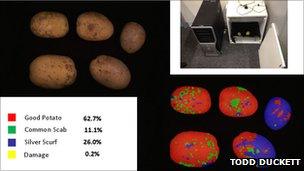New potato-spotting AI built with off-the-shelf tech
- Published

A "learning" computer system that sorts potatoes has been built using off-the-shelf technology by researchers at the University of Lincoln's Robotics Lab.
The robot blemish spotter can reliably identify diseases such as silver scurf and common scab, researchers said.
The test system uses computer kit not dissimilar from systems many gamers will have in their homes.
The UK potato industry is worth about £3.5bn, but much of the sorting of produce is still done by hand.
TADD - or the Trainable Anomaly Detection and Diagnosis system - is able to "detect, identify and quantify many of the common blemishes affecting potatoes", Dr Tom Duckett of the University of Lincoln told the BBC.
Human teacher
The key innovation, in Mr Duckett's view, is the learning software which is trained by a human expert to identify diseased or damaged produce.
"Existing computer vision systems have to be programmed and calibrated. Our system is different it learns from some samples provided from a human expert," he said.
TADD is only a vision system at present, but just spotting an off-colour spud is harder than it sounds.
"When potatoes get too much light they tend to go green, but in red potato varieties greening looks more black," said Mr Duckett.
But because TADD uses artificial intelligence (AI) systems, it can be trained to deal with different varieties.
Gamer tech
TADD was built using inexpensive, everyday computing gear.
"We used the lowest-quality, cheapest images sensor that we could - a webcamera costing £60. We are also using a standard desktop computer," said Mr Duckett.
The system also makes use of a graphics processing unit (GPU) of the sort used to help process images in games.
"What a GPU is doing in a games context is turning information into graphics or images, whereas we're using it in a reverse way to extract information from images," said Mr Duckett.
Mr Duckett said he believed the smart system was highly adaptable: "We know we can apply this to other kinds of produce, for example carrots and apples and so on."
In fact he says the team is working towards a "general purpose" anomaly detection system.
Potato problem
TADD is currently being tested with a local potato-buying firm, Branston, where it has performed at least as well as its human teachers.
But Mr Duckett, who sorted potatoes while a student, doesn't think his system will completely remove the need for human potato-picking skills.
"I've done these jobs myself. We're not removing the human element, it still relies on a human expert to train the system, but what we're removing is some of the dull, drudgish parts."
The sorting of potatoes may seem an unglamorous application for artificial intelligence, but Mr Duckett argues that the challenges of potato sorting are greater than those found in the polished corridors of high-tech production lines.
"The humble spud that we all eat every day is perhaps something you wouldn't think about when it comes to applications of AI, but potatoes - like ourselves - are all different, so it's actually quite a challenging pattern-recognition problem."
- Published17 November 2011
- Published23 August 2011